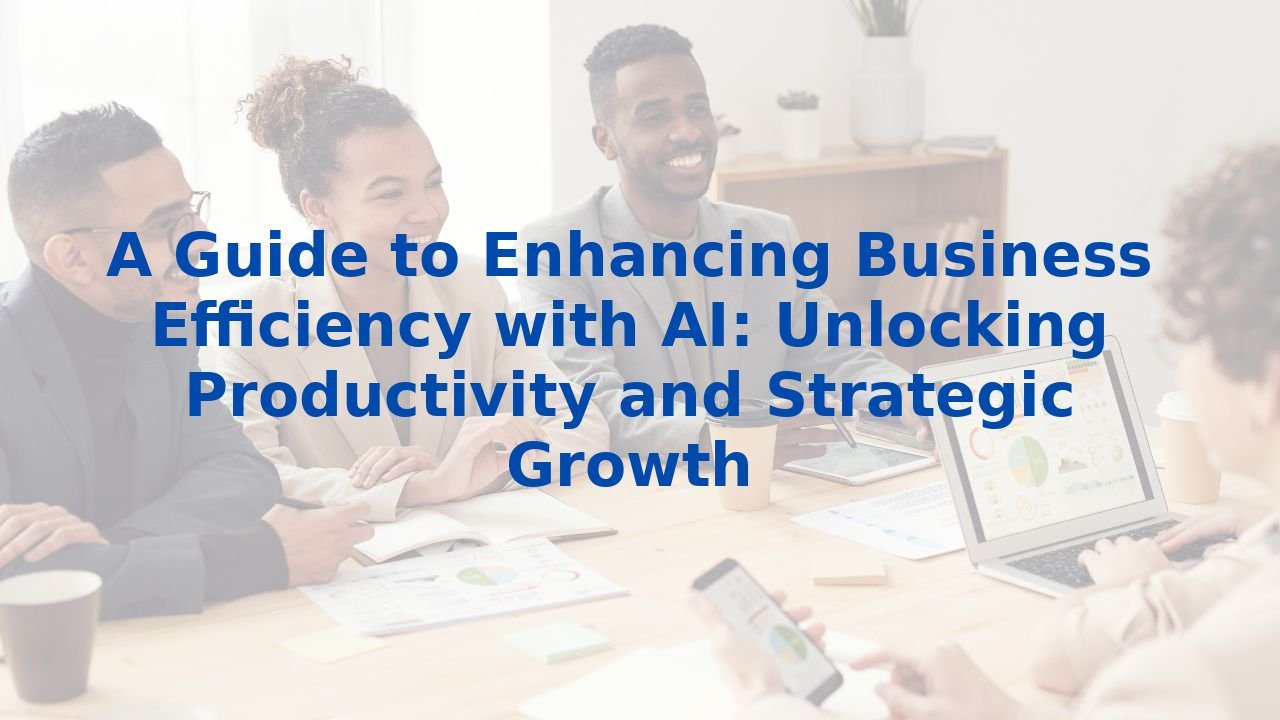A Guide to Enhancing Business Efficiency with AI: Unlocking Productivity and Strategic Growth
Enhancing Business Efficiency with AI: Unlocking Productivity and Strategic Growth
Introduction
In an era where speed and efficiency define success, businesses must continually adapt to remain competitive. The incorporation of artificial intelligence (AI) into everyday operations offers an unprecedented opportunity to enhance productivity and foster strategic growth. This guide will explore how AI can elevate key business processes, the remarkable benefits it brings in terms of efficiency, and the crucial need for employee training to harness its full potential.
Automating Repetitive Tasks
One notable advantage of AI lies in its ability to automate repetitive tasks that consume precious time and resources. From data entry to form population and even document summarization, AI handles monotonous processes with ease, minimizing human error in the process. This automation liberates employees, allowing them to redirect their focus toward more creative and strategic initiatives. As a result, organizations can elevate their output and foster an environment ripe for innovation.
Enhancing Communication and Collaboration
Effective communication is foundational to any thriving organization. AI-powered tools enhance this aspect by automating routine messages and enabling smoother information flow between teams. AI’s capabilities extend to coordinating schedules, analyzing calendars, and determining the most opportune moments for meetings—taking into account availability and priorities. By optimizing communication and collaboration, AI empowers teams to work more cohesively and effectively achieve their goals.
Improving Decision-Making
In a world awash with data, the ability to make informed decisions is paramount. AI excels at analyzing vast amounts of information, uncovering patterns and insights that might elude human analysts. This powerful analytical capability is transformative for businesses, enhancing decision-making processes in critical areas. From forecasting demand to identifying new growth opportunities and mitigating risks, the insights gained through AI can provide the competitive edge necessary to thrive in today’s dynamic landscape.
Optimizing Resource Allocation
Time is one of the most valuable assets in a business, and AI enhances the way resources are allocated and managed. By assessing employee skills, availability, and project requirements, AI ensures optimal resource distribution, maximizing productivity while minimizing bottlenecks. When teams are appropriately resourced, the organization can anticipate and respond to market demands more effectively, driving operational excellence and efficiencies throughout the enterprise.
Streamlining Operations
AI’s ability to automate multi-step workflows is a game changer for operational efficiency. By streamlining processes, businesses can significantly reduce time spent on mundane tasks. For instance, AI can craft personalized emails and automate responses, easing the communication burden and enhancing customer service experiences. This streamlining enables employees to devote more time and energy to higher-level thinking and strategic tasks, paving the way for growth and innovation.
The Importance of Employee Training
AI’s integration into business operations is only as effective as the people who wield it. Therefore, training employees on the application of AI tools is essential. An equipped workforce that understands AI’s capabilities and limitations is crucial for maximizing its benefits. Training initiatives should focus on developing skills in data analysis, pattern recognition, and strategic decision-making—ensuring employees can seamlessly incorporate AI into their workflows.
Investing in employee education around AI empowers organizations to build dynamic, adaptable teams ready to tackle tomorrow's challenges. As AI continues to evolve, so too must the workforce’s skills, keeping pace to exploit the full range of possibilities that artificial intelligence offers.
Conclusion
As we navigate an increasingly digital landscape, the strategic integration of AI into business processes is vital for those seeking to enhance efficiency and drive productivity. From automating repetitive tasks and improving communication to optimizing decision-making and streamlining operations, the benefits are profound. However, to truly unlock AI’s potential, organizations must also prioritize training their workforce to effectively utilize these transformative tools.
Embracing AI is not just a choice—it's a necessity for sustainable growth and competitive advantage in the modern business world. By championing both technology and talent, organizations can forge a path toward a more innovative and productive future.



